News
As GitHub Quits Atom for VS Code, GitLab Revamps Web IDE (Based on VS Code)
The reach of Microsoft's super-popular, open source-based Visual Studio Code editor is still expanding, now supplying the tech for two of the most prominent code repository platforms, GitHub and GitLab.
Microsoft-owned GitHub, the leader in that space, put its Atom code editor to bed earlier this month following a June announcement wherein it said "we've decided to retire Atom in order to further our commitment to bringing fast and reliable software development to the cloud via Microsoft Visual Studio Code and GitHub Codespaces." The latter is basically browser-based VS Code served up from the cloud.
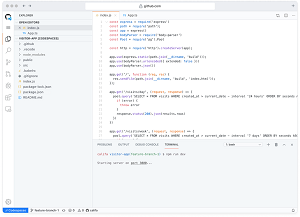 [Click on image for larger view.] GitHub's Codespaces (source: GitHub).
[Click on image for larger view.] GitHub's Codespaces (source: GitHub).
And, on the very same day (Dec. 15), GitLab posted "A first look at the new GitLab Web IDE and remote development experience," discussing "our decision to rebuild the Web IDE on top of the open source VS Code project."
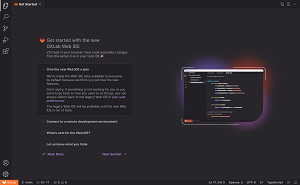 [Click on image for larger view.] Web IDE (source: GitLab).
[Click on image for larger view.] Web IDE (source: GitLab).
Which all speaks to the enormous popularity of VS Code, having for years topped many developer tooling surveys.
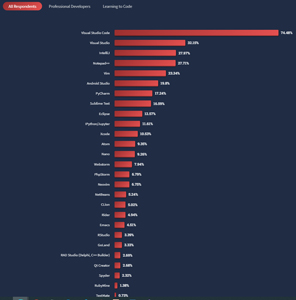 [Click on image for larger view.] Top IDEs in 2022 (source: Stack Overflow).
[Click on image for larger view.] Top IDEs in 2022 (source: Stack Overflow).
As of Dec. 19, a beta version of GitLab's revamped Web IDE became the default editing experience across the platform. "Developers and non-developers alike need to be able to contribute from anywhere, across multiple projects, and without context switching or the need to manage a local development environment," GitLab said in its Dec. 15 post. "The new Web IDE is more user-friendly and efficient, combining VS Code's powerful core features with significantly improved performance and the ability to securely connect to a remote development environment directly from the Web IDE."
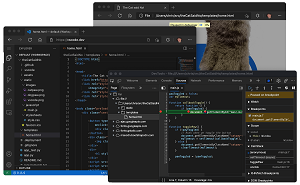 [Click on image for larger view.] VS Code for the Web (source: Microsoft).
[Click on image for larger view.] VS Code for the Web (source: Microsoft).
That reference to remote development is telling because the practice exploded after the advent of the COVID-19 pandemic, which sent workers (including developers) across the IT industry (and many others) to work from home, abandoning offices and cubicles. That trend likely contributed to the many new VS Code-related online offerings as browser-based development took on more importance, as Visual Studio Magazine covered in the August article, "VS Code Emerges As Remote Development Superstar."
 [Click on image for larger view.] The Older Way (source: Microsoft).
[Click on image for larger view.] The Older Way (source: Microsoft).
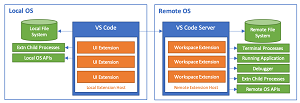 [Click on image for larger view.] The Newer Way (with GitHub Codespaces) (source: Microsoft).
[Click on image for larger view.] The Newer Way (with GitHub Codespaces) (source: Microsoft).
Highlights of the Web IDE revamp included:
- A flexible and customizable interface with collapsible panels and custom themes
- Contextual actions and drag & drop support in the file panel
- Find and replace across all open files
- An interactive document outline and visual history panel
- Up to 80 percent reduction in memory usage over the previous Web IDE
- Improved reliability of tracking changes to files and directories
- Better support for touchscreen devices such as tablets and (larger) smartphones
As far as remote development, GitLab said "the beta introduces an entirely new category to GitLab by making it possible to securely connect to a remote development environment, run commands in an interactive terminal panel, and get real-time feedback from right inside the Web IDE." That's demonstrated in the video below:
Future work for the project includes adding support for VS Code extensions, which is key functionality given that the vast array of tools in the VS Code Marketplace provides the barebones code editor with all kinds of features and functionality that make it perform like a full-fledged IDE.
Meanwhile, GitHub explained why it's sunsetting Atom, which debuted in 2015 and is closely tied to the Electron Framework, which just happens to be the main framework that enables the cross-platform desktop VS Code application to run on Windows, macOS and Linux.
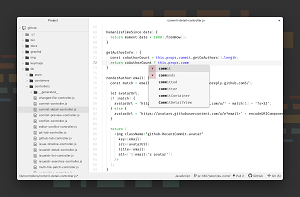 [Click on image for larger view.] Atom (source: GitHub).
[Click on image for larger view.] Atom (source: GitHub).
"Atom has not had significant feature development for the past several years, though we've conducted maintenance and security updates during this period to ensure we're being good stewards of the project and product," GitHub said. "As new cloud-based tools have emerged and evolved over the years, Atom community involvement has declined significantly. As a result, we've decided to sunset Atom so we can focus on enhancing the developer experience in the cloud with GitHub Codespaces.
"This is a tough goodbye. It's worth reflecting that Atom has served as the foundation for the Electron framework, which paved the way for the creation of thousands of apps, including Microsoft Visual Studio Code, Slack, and our very own GitHub Desktop. However, reliability, security, and performance are core to GitHub, and in order to best serve the developer community, we are archiving Atom to prioritize technologies that enable the future of software development."
Atom users were advised of the following post-sunsetting ramifications:
With VS Code at the center of these dual initiatives from GitHub and GitLab -- and being the most successful product springing from Electron open source lineage -- it looks like someday it may just be VS Code all the way down.
About the Author
David Ramel is an editor and writer at Converge 360.